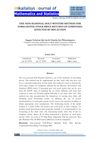 92 citations,
December 2012 in “Current opinion in genetics & development”
92 citations,
December 2012 in “Current opinion in genetics & development” Turing patterns are now recognized as important in developmental biology.
[object Object]  1 citations,
December 2021 in “Tropical Journal of Pharmaceutical Research”
1 citations,
December 2021 in “Tropical Journal of Pharmaceutical Research” Kanglaite injection with chemotherapy improves treatment and reduces side effects for advanced lung cancer.
 February 2024 in “Mikailalsys Journal of Mathematics and Statistics”
February 2024 in “Mikailalsys Journal of Mathematics and Statistics” The method accurately predicted stock price changes, showing most companies' returns decreased due to BDS actions.
1 citations,
October 2023 in “Animals” Certain DNA regions in alpacas are linked to fiber diameter.



